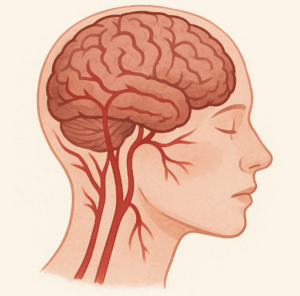Vascular Dementia: When Strokes Steal the Mind
 A Case to Begin With
A Case to Begin With
Mrs. R, a 68-year-old retired schoolteacher, had two minor strokes over three years. After each episode, her family noticed small but worrying changes: she struggled to manage her finances, grew unusually irritable, and often forgot the names of her grandchildren. Unlike the gradual decline seen in Alzheimer’s, her symptoms worsened suddenly after each stroke — leaving behind a trail of lost abilities.
Her doctors diagnosed vascular dementia, a condition where brain damage from poor blood flow causes a stepwise decline in thinking and memory.
What Is Vascular Dementia?
Vascular dementia (VaD) is the second most common cause of dementia after Alzheimer’s. It occurs when reduced blood supply damages brain tissue. Unlike Alzheimer’s, where memory loss dominates, VaD often begins with slowed thinking, planning problems, and emotional changes.
Key Symptoms to Watch For
-
Cognitive symptoms:
-
Slowed thinking, reduced attention span.
-
Executive dysfunction (difficulty planning or organizing).
-
Memory loss (usually milder than in Alzheimer’s early on).
-
-
Neuropsychiatric symptoms:
-
Depression, apathy, emotional lability.
-
Irritability, anxiety.
-
Pseudobulbar affect (involuntary laughing or crying).
-
-
Neurological clues:
-
Gait disturbance, imbalance.
-
Focal deficits (weakness, slurred speech).
-
Causes and Risk Factors
-
Hypertension, diabetes, high cholesterol.
-
Heart disease, atrial fibrillation.
-
Smoking, obesity, sedentary lifestyle.
-
Previous strokes or transient ischemic attacks (TIAs).
Diagnosis
-
Clinical history: stepwise decline, history of vascular risk factors.
-
Cognitive testing: MMSE, MoCA (executive dysfunction more than memory).
-
Imaging: MRI/CT shows infarcts, white matter hyperintensities, or lacunar strokes.
-
Criteria: DSM-5 Major Vascular Neurocognitive Disorder, NINDS-AIREN.
Management Strategies
1. Risk factor control:
-
Blood pressure, diabetes, lipid management.
-
Smoking cessation, exercise, healthy diet.
2. Stroke prevention:
-
Antiplatelets (aspirin, clopidogrel).
-
Anticoagulation if atrial fibrillation.
3. Cognitive symptoms:
-
Cholinesterase inhibitors (donepezil) and memantine — modest benefits.
-
Cognitive rehabilitation, occupational therapy.
4. Neuropsychiatric symptoms:
-
SSRIs (sertraline, escitalopram) for depression.
-
Low-dose antipsychotics (quetiapine, risperidone) for severe agitation/psychosis — used cautiously.
-
Supportive therapies: psychotherapy, caregiver counseling.
Why It Matters
Vascular dementia highlights how heart health and brain health are inseparable. Unlike Alzheimer’s, where treatments are limited, VaD progression can be slowed significantly with aggressive risk factor management. Every blood pressure check, every lifestyle change, is a form of dementia prevention.
Key Takeaway
Not all memory loss is Alzheimer’s. When strokes steal brain function in steps, vascular dementia should be on the radar. Early recognition and vascular control can make the difference between dependence and independence.
About the Author
Dr. Srinivas Rajkumar T
Consultant Psychiatrist
Apollo Clinic, Velachery, Chennai
📞 85951 55808